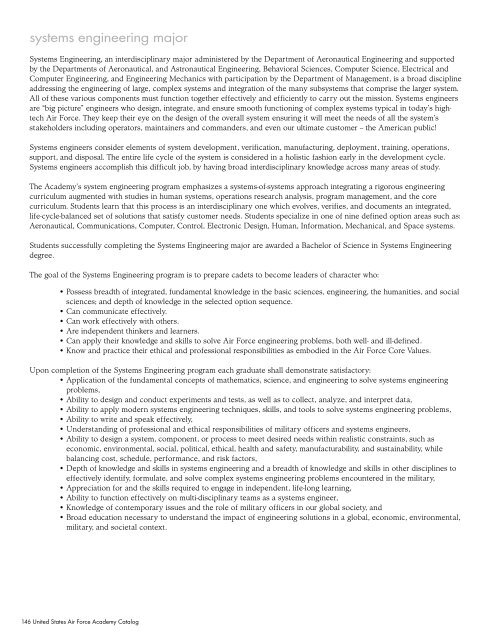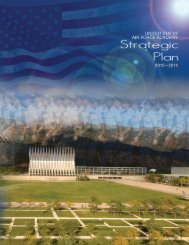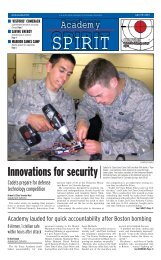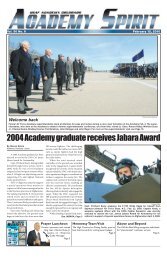2008-2009 Catalog - United States Air Force Academy
2008-2009 Catalog - United States Air Force Academy
2008-2009 Catalog - United States Air Force Academy
Create successful ePaper yourself
Turn your PDF publications into a flip-book with our unique Google optimized e-Paper software.
systems engineering major<br />
Systems Engineering, an interdisciplinary major administered by the Department of Aeronautical Engineering and supported<br />
by the Departments of Aeronautical, and Astronautical Engineering, Behavioral Sciences, Computer Science, Electrical and<br />
Computer Engineering, and Engineering Mechanics with participation by the Department of Management, is a broad discipline<br />
addressing the engineering of large, complex systems and integration of the many subsystems that comprise the larger system.<br />
All of these various components must function together effectively and efficiently to carry out the mission. Systems engineers<br />
are “big picture” engineers who design, integrate, and ensure smooth functioning of complex systems typical in today’s hightech<br />
<strong>Air</strong> <strong>Force</strong>. They keep their eye on the design of the overall system ensuring it will meet the needs of all the system’s<br />
stakeholders including operators, maintainers and commanders, and even our ultimate customer -- the American public!<br />
Systems engineers consider elements of system development, verification, manufacturing, deployment, training, operations,<br />
support, and disposal. The entire life cycle of the system is considered in a holistic fashion early in the development cycle.<br />
Systems engineers accomplish this difficult job, by having broad interdisciplinary knowledge across many areas of study.<br />
The <strong>Academy</strong>’s system engineering program emphasizes a systems-of-systems approach integrating a rigorous engineering<br />
curriculum augmented with studies in human systems, operations research analysis, program management, and the core<br />
curriculum. Students learn that this process is an interdisciplinary one which evolves, verifies, and documents an integrated,<br />
life-cycle-balanced set of solutions that satisfy customer needs. Students specialize in one of nine defined option areas such as:<br />
Aeronautical, Communications, Computer, Control, Electronic Design, Human, Information, Mechanical, and Space systems.<br />
Students successfully completing the Systems Engineering major are awarded a Bachelor of Science in Systems Engineering<br />
degree.<br />
The goal of the Systems Engineering program is to prepare cadets to become leaders of character who:<br />
• Possess breadth of integrated, fundamental knowledge in the basic sciences, engineering, the humanities, and social<br />
sciences; and depth of knowledge in the selected option sequence.<br />
• Can communicate effectively.<br />
• Can work effectively with others.<br />
• Are independent thinkers and learners.<br />
• Can apply their knowledge and skills to solve <strong>Air</strong> <strong>Force</strong> engineering problems, both well- and ill-defined.<br />
• Know and practice their ethical and professional responsibilities as embodied in the <strong>Air</strong> <strong>Force</strong> Core Values.<br />
Upon completion of the Systems Engineering program each graduate shall demonstrate satisfactory:<br />
• Application of the fundamental concepts of mathematics, science, and engineering to solve systems engineering<br />
problems,<br />
• Ability to design and conduct experiments and tests, as well as to collect, analyze, and interpret data,<br />
• Ability to apply modern systems engineering techniques, skills, and tools to solve systems engineering problems,<br />
• Ability to write and speak effectively,<br />
• Understanding of professional and ethical responsibilities of military officers and systems engineers,<br />
• Ability to design a system, component, or process to meet desired needs within realistic constraints, such as<br />
economic, environmental, social, political, ethical, health and safety, manufacturability, and sustainability, while<br />
balancing cost, schedule, performance, and risk factors,<br />
• Depth of knowledge and skills in systems engineering and a breadth of knowledge and skills in other disciplines to<br />
effectively identify, formulate, and solve complex systems engineering problems encountered in the military,<br />
• Appreciation for and the skills required to engage in independent, life-long learning,<br />
• Ability to function effectively on multi-disciplinary teams as a systems engineer,<br />
• Knowledge of contemporary issues and the role of military officers in our global society, and<br />
• Broad education necessary to understand the impact of engineering solutions in a global, economic, environmental,<br />
military, and societal context.<br />
146 <strong>United</strong> <strong>States</strong> <strong>Air</strong> <strong>Force</strong> <strong>Academy</strong> <strong>Catalog</strong>
















